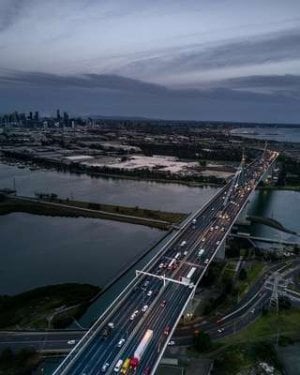Aussie state's new road rules to include more drivers soon
By
Danielle F.
- Replies 24
In a digital age where convenience is king, many local states have slowly integrated technology into government services.
One state revealed their plans that could affect nearly one million motorists soon.
Victoria recently expanded its digital licence scheme to include learner and provisional drivers,
This could revolutionise the way Victorians carry and present their driver's licence when driving.
Starting this week, around 800,000 L and P-plate drivers may now carry their driver's licence electronically.
This approach caters to drivers who prefer bringing digital licences.
It could also be a step towards streamlining the identification process for young and learning drivers.
Drivers can access their digital licences through the Service Victoria app or myVicRoads app.
This transition was part of a broader adoption of digital licences.
About 1.2 million other motorists already have their digital licences activated.
The digital licence has a 'highly secure, timed QR code', which could be scanned by businesses and authorities to verify authenticity.
This feature should combat fraudulent use and ensure that the digital licence is as reliable as its physical counterpart.
The digital document should also provide real-time updates on a licence's status, including any cancellations or suspensions.
Drivers may also update personal information through the digital licence as needed.
Victoria's Minister for Roads and Road Safety, Melissa Horne, expressed that the expansion could simplify lives not just for learners but for other drivers as well.
'L and P-platers will be able to access their licence on their phone just in time for summer – making it easier for them to go about their lives,' Ms Horne stated.
I'm sure we'll continue to see a strong take up from our younger drivers.'
Victoria's adoption of digital licences followed other states.
Queensland and New South Wales have already implemented similar initiatives in their states.
South Australia pioneered the use of digital licences in 2017.
Meanwhile, the Northern Territory is scheduled to undergo a trial program for 2025.
Tasmania, Western Australia, and the Australian Capital Territory are yet to announce plans for such technology.
Prior to the official rollout last May, Victoria did a six-month trial in Ballarat.
About 15,000 residents downloaded their licences to the Service Victoria or myVicRoads app.
Despite the trial's success, there were concerns regarding security, particularly around fraud and identity theft, as some digital licences showed misspelt surnames.
As drivers embrace digital licensing, drivers should understand its implications and benefits.
It offers a convenient way to carry and present identification and could provide enhanced security features and the ability to keep personal information up to date.

Have you or someone you know made the switch? What was the experience like? We invite you to share your thoughts and experiences with digital licences in the comments section below.
One state revealed their plans that could affect nearly one million motorists soon.
Victoria recently expanded its digital licence scheme to include learner and provisional drivers,
This could revolutionise the way Victorians carry and present their driver's licence when driving.
Starting this week, around 800,000 L and P-plate drivers may now carry their driver's licence electronically.
This approach caters to drivers who prefer bringing digital licences.
It could also be a step towards streamlining the identification process for young and learning drivers.
Drivers can access their digital licences through the Service Victoria app or myVicRoads app.
This transition was part of a broader adoption of digital licences.
About 1.2 million other motorists already have their digital licences activated.
The digital licence has a 'highly secure, timed QR code', which could be scanned by businesses and authorities to verify authenticity.
This feature should combat fraudulent use and ensure that the digital licence is as reliable as its physical counterpart.
The digital document should also provide real-time updates on a licence's status, including any cancellations or suspensions.
Drivers may also update personal information through the digital licence as needed.
Victoria's Minister for Roads and Road Safety, Melissa Horne, expressed that the expansion could simplify lives not just for learners but for other drivers as well.
'L and P-platers will be able to access their licence on their phone just in time for summer – making it easier for them to go about their lives,' Ms Horne stated.
I'm sure we'll continue to see a strong take up from our younger drivers.'
Victoria's adoption of digital licences followed other states.
Queensland and New South Wales have already implemented similar initiatives in their states.
South Australia pioneered the use of digital licences in 2017.
Meanwhile, the Northern Territory is scheduled to undergo a trial program for 2025.
Tasmania, Western Australia, and the Australian Capital Territory are yet to announce plans for such technology.
Prior to the official rollout last May, Victoria did a six-month trial in Ballarat.
About 15,000 residents downloaded their licences to the Service Victoria or myVicRoads app.
Despite the trial's success, there were concerns regarding security, particularly around fraud and identity theft, as some digital licences showed misspelt surnames.
As drivers embrace digital licensing, drivers should understand its implications and benefits.
It offers a convenient way to carry and present identification and could provide enhanced security features and the ability to keep personal information up to date.
Key Takeaways
- Victoria just expanded its digital licence scheme to include up to 800,000 learner and provisional plate drivers.
- The digital licence has a secure, timed QR code to verify authenticity and prevent fraudulent use. It could also show real-time updates on licence cancellations or suspensions.
- The scheme was part of an initiative to simplify the lives of drivers.
- While Victoria has followed other Australian states in implementing digital licences, there were several security concerns during its trial period.








